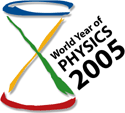|
Netherlands
For further information related to Netherlands events, contact the Coordinator:
Prof. Jo Hermans
Leiden University
Huygens Laboratory Faculty of Mathematics & Natural Sciences
P.O. Box 9504
2300 RA Leiden, Netherlands
tel: +31 71 527 5824 • fax: +31 71 527 5819
Email: hermans@wyp2005.nl Useful links:
www.wyp2005.nl
Events:
-
Science on the Beach:
Science is brought to the crowds of people holidaying on the 100 km long Dutch beach in midsummer. A caravan of various vehicles, manned with a dozen physics staff and students, travels along the beach from north to south in two weeks. The train features a hydrogen car and a solar car, among others. The central topic is energy (as consumable good in daily life). Solar energy, wind energy, tidal and wave energy can be demonstrated on the beach, as well as the use of hydrogen as an energy carrier. Also, chemical, biological and astronomical topics will be part of the education and information programme. In addition to having its own educational value, this activity also serves to draw the attention of the public and the media to the main event (see below).
-
Physics in the Department Store:
In every university city a physics show with spectacular demonstrations will be organized in the marketplace or in one or more large department stores. The public will be treated to this 'info-tainment' during the first two weekends in June. These shows will also promote the main physics event - tentatively termed 'Discovery Festival' - which will take place in Amsterdam during the second half of June 2005.
-
'Discovery Festival' the main event:
The main physics event, tentatively termed 'Discovery Festival', will take place in the centre of Amsterdam. Each of the 9 Dutch universities with a physics department develops four super exhibits. At least two of these exhibits refer to cutting-edge science and technology, while others demonstrate interesting and thought-provoking physical phenomena. In addition, industry will provide examples of modern technology, illustrating the link between science and its application in everyday life. In parallel, public lectures will be given by selected scientists in an adjacent auditorium. The physics content will be accompanied by issues from music, drama theatre, sculpture and other elements which have a connection with creativity. The Event will last a whole week in the second half of June 2005.
-
Twelve Physics posters:
A physics poster will be launched every month (analogous to the UK initiative in the WMY2k, see www.newton.cam.ac.uk/wmy2kposters/index.html) and spread over the country. As posters are too small to contain more than a 'teaser' (text and graphics), more information about the topics brought up can be found on the supporting website. The twelve subjects include Physics and Healthcare, Happiness (biochemistry of the brain), Sex and Science, Communication, and of course also the Big Bang, Einstein, the Structure of Matter. The series of 12 topics also forms the basis for a PR campaign via the media.
-
HowStuffWorks cards:
We plan to produce a series of 52 'HowStuffWorks' cards, each featuring an every-day-life object or phenomenon with a science background. Examples include: How does a microwave oven work? And the internet? A CD-player? Thunder? A rainbow? The idea is to give a brief explanation on the card itself, and to refer the reader to a popular science website (www.kennislink.nl) for more information. The cards should become popular collectors items among the young. This project is planned in cooperation with the Belgian Physical Society.
-
Various activities throughout the year:
In addition to the above, a publicity campaign is planned during the whole year, to be deployed in the press, on radio and TV, in order to reach the general public. As an example, a series of popular science topics is planned in the largest periodical in the Netherlands, i.e. the magazine of the Tourist Association. The aim is to show the fun of science in phenomena of everyday life, and to draw the attention to the World Year of Physics events. For the young computer generation: an Adventure Game will be launched in which Einstein and his achievements will have a key role.
Activities planned for High Schools
-
Shows and lectures:
Schools will be offered the possibility to be visited by one out of a variety of shows (such as the 'Fusion Road Show' and a travelling physics circus) or, alternatively, by a selected young university researcher giving a lecture on a cutting-edge research topic.
-
HISPARC:
The High School Project for Astrophysics Research on Cosmics involves active participation of clusters of neighbouring high schools in the detection of high-energy cosmic rays. Because of their high energy, these rays generate secondary particles covering an area on the order of a square kilometer. Using correlation techniques, the detected antenna signals can be attributed to a single cosmic ray. This project is already underway.
-
National School Teams Contest:
In analogy to the successful Freestyle Physics programme deployed in Germany in recent years, high school kids will be invited to build the best performing model of certain devices (within certain constraints), such as a submarine which surfaces after one minute, a hot air balloon, a water rocket etc. We expect to bring together in this contest over one thousand pupils - teams from 300 schools - accompanied by some 300 teachers. The activities in this project are mainly intended to trigger curiosity, to show the fun of solving scientific and technical problems, and to increase insight in physics experiments. In parallel, laboratory visits and lectures on selected topics will be organised for the participants.
|
